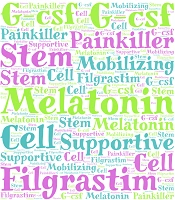Dear Editor,
Melatonin's pain-relieving properties have been well-documented (1, 2). The analgesic effects of melatonin appear to be associated with the involvement of β-endorphins, opioid receptors, GABA receptors, and the nitric oxide-arginine signaling pathway (3). Existing data suggest that its significant role in mitigating drug-related pain warrants serious attention (4, 5).
Beyond its antinociceptive effects, melatonin exhibits broader therapeutic benefits, including the promotion of proliferation, renewal, viability, and differentiation of various stem cells (6, 7). In this regard, we emphasize a pivotal clinical trial that will, for the first time, investigate the synergistic benefits of combining melatonin with granulocyte colony-stimulating factor (G-CSF) on hematopoietic stem cell mobilization. Melatonin, due to its antioxidant and anti-inflammatory properties and its regulatory effects on cellular signaling and the immune system, can improve the bone marrow microenvironment and enhance the mobilization of hematopoietic stem cells (8). The dual functions of melatonin — stem cell mobilization and analgesia — appear underexplored, and we aim to elucidate its innovative applications in these patients. This strategy manages two challenges at the same time.
Bone and musculoskeletal pain, a frequent side effect of G-CSF therapy, likely stems from marrow expansion, nociceptor hypersensitivity, immune dysregulation, inflammatory cytokine release, and altered bone metabolism (9). Given the absence of effective treatments, co-administering melatonin with G-CSF presents a novel approach. Melatonin complements G-CSF by reducing oxidative stress (via SIRT1/Nrf2 signaling), suppressing pro-inflammatory cytokines (e.g., TNF-α, IL-6), and stabilizing the neuro-immune microenvironment (10).
Although this idea has not yet been considered, melatonin deserves further evaluation as a promising option for improving pain management and quality of life in stem cell donors treated with G-CSF. Publishing this work in your journal could help encourage further research into melatonin's potential adjunctive role in both autologous and allogeneic hematopoietic stem cell transplantation.
